| Cooper Versus Shepard |
| In May 1969 Gordon Cooper sat in Mission Control, Houston, joking with the crew of Apollo 10 as they headed towards the moon knowing that one day he too would take the same journey. It was a natural assumption to make after two flawless personal performances aboard two highly successful spaceflights. He had been an astronaut from the beginning of the manned spaceflight program and he had flown during the two previous manned programs of Mercury and Gemini. After serving as Apollo 10 back-up commander he was now ready to take Apollo 13 to the Moon. |
 |
| Gordon Cooper in his silver Mercury space suit ready to orbit the Earth longer than any other American had done before. |
If the story had ended there with Shepard taking his turn in the crew rotation and serving on a back-up crew, then his would have been an inspirational tale of determination to overcome the odds to get back into line for a spaceflight. The truth, however, is Shepard was only concerned with getting his own moon mission and so he went immediately to his old friend Slayton who was responsible for choosing the crews to fly Apollo. At that meeting Shepard demanded to be placed on the next available flight which was Apollo 13. Slayton knew that this rightfully belonged to Gordon Cooper who had paid his dues on the backup crew for Apollo 10 but the official announcement of the crew had yet to be made. |
 |
 |
 |
| "What's wrong with this picture? Tom Stafford was backup commander for Apollo 7 and went on three missions later to command Apollo 10. Neil Armstrong was backup commander for Apollo 8 and was promoted to command Apollo 11. Pete Conrad was backup commander for Apollo 9 and commanded Apollo 12. Gordo Cooper was backup commander for Apollo 10 and Alan Shepard was named to command Apollo 13. The three mission rotation had been junked." That was Eugene Cernan's description of how Gordon Cooper was denied his chance of walking on the Moon from his book, "The Last Man On The Moon". Behind this simplified version of events is a story of internal politics and self interest that has tarnished the "For All Mankind" philosophy of the Apollo Program. |
 |
| Alan Shepard was furious at missing out on being the first man in space when he heard that Gagarin had orbited the Earth. |
| How Shepard spent most of Gemini and Apollo, watching others launched into space, this time it's the crew of Gemini 11. |
| After Mercury, Shepard was chosen as the commander of Gemini 3, the first mission of the new program, but during training he had spells of dizziness that resulted in the doctors grounding him and removing him from active astronaut status. With the inner ear medical condition Menieres keeping him on the ground he stayed at NASA to help Deke Slayton run the astronaut office. If things had stayed like this then it could well have been Cooper who would have gone to the moon as commander of Apollo 13 but Shepard was told by Thomas Stafford about a doctor who was performing a new type of surgery that could correct his medical problem. Shepard decided to have the surgery that could correct Menieres and he then consulted a NASA doctor who examined him thoroughly and found that after several frustrating years he was fit enough to join the active astronaut list again. |
| Slayton thought that if Shepard, a man grounded by a severe medical problem, could get a flight then his own chances of flying were greatly improved. Whereas he had nothing to gain by swapping Shepard for Cooper before Mercury 9, he now had a reason to get Shepard back into space. Cooper later wrote that he expected no less from Shepard but Slayton's betrayal of a fellow Air Force comrade was very bitter. Slayton later wrote about Apollo 13 that his first choice for that mission was Shepard and that Cooper had not been up to the task of commanding it. How things had changed from the days of Mercury 9 when he had stood by Cooper saying, "I knew Gordo would knuckle down and do the job, and he did". Maybe if Cooper had been given the command of Apollo 13 he would have once again put in an exemplary performance like he had done during his previous missions. As it was he never got what many see was his rightful chance. Shepard, the very antithesis of the scientist astronaut, played golf on the moon and gave the critics of the Apollo Program something that they had never had before, a reason to criticise the astronauts themselves. As for Slayton, he eventually flew aboard the final Apollo flight with the Soviets after an astronaut career of 16 years. |
| Slayton before being grounded from Mercury Atlas 7 |
| Cooper kept his mission and made it into space on the second attempt following a launch scrub on the previous day. Some people have tried to point out that Cooper had benefited by going last in the Mercury Program because others had gone before him and now he was riding a tried and tested rocket. This does the man a great disservice because Atlas rockets were still exploding during launch and now Cooper was sitting on top of 200,000 pounds of rocket fuel. After Shepard's 297 mile Mercury mission the Soviet leader Nikita Khrushchev called it a, "flea's jump", following Cooper's 583,469 mile journey he was a little more diplomatic calling it, "A new contribution to the exploration of outer space" and adding that, "The Soviet people send the courageous American cosmonaut Gordon Cooper their congratulations and best wishes". In one leap Gordon Cooper had spent more time in space than all the other Mercury astronauts put together, he was the youngest of the Mercury 7 and was looking forward to a long and successful space career, as his mother said to his grandmother following the mission, "We'll have to do it all again when Gordon goes to the moon". Walt Williams, Director of Mercury operations, described Cooper's mission as a, "textbook flight", because, "in the last five hours we used every page in the book". He followed this up by stating for the record that during the mission Cooper was, "very much on top of the situation...this guy really shined". Alan Shepard, his back-up for the mission, complimented Cooper saying that he had completed, "a magnificent performance...it's a tribute to his pre-flight training". Both Shepard's and William's praise must have been doubly satisfying because they had both tried to get Cooper off the mission but he had proved that he was more than capable of handling the dangers of spaceflight. |
| Cooper with President Kennedy at KSC Nov 1963 |
| I was originally scheduled for Apollo 14, which would be the natural selection, I was the backup commander on Apollo 11 and then selected to go over to Apollo 14. Al Shepard, who was grounded for many years due to Menieres Syndrome had a successful operation that cleared up the problem so he, being a very aggressive individual, lobbied very hard for a flight of the Apollo Program and they gave him the flight of Apollo 13. As he started to train it dawned on NASA management that Shepard having only 15 minutes of sub-orbital flight ought to give him a little more time to train and so one day Deke Slayton came to me and asked me if I would mind giving him my flight and I would take his Apollo 13 flight. Well I was happy about that, they would allow me to go to the moon about 6 months earlier. |
| The selection of the Apollo 13 and Apollo 14 crews has been well documented, some accounts are more accurate than others. Depending on who you listen to, you would get different recollections on the crew selections. |
| Cooper in Mission Control watching the progress of Apollo 10 as it headed towards the moon. |
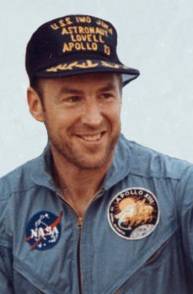 |
| In 1971 Alan Shepard commanded the Apollo 14 mission to the moon on mankind's third successful lunar landing mission. A few years earlier this seemed like an impossible dream due to a severely debilitating disease that had grounded him. Gordon Cooper had flown two very demanding missions during Mercury and Gemini and had come through them both with flying colours. What happened to make the fates of both these men so intertwined in the race for the ultimate prize, a journey to the moon's surface? |
 |
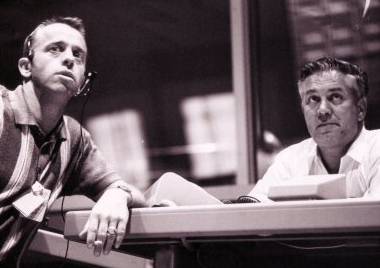 |
| For all the drama before and during his mission Cooper remained the true professional saying of the potentially life threatening situation that had developed prior to re-entry, "I had a few little problems but nothing major". The director of manned space flight for NASA said the mission was, "Another step toward going to the moon and making America first in space. We're all pretty happy". Later Cooper would find out that he had friends in high places and wrote how, "President Kennedy, whom I'd met more than a dozen times, had gotten wind that I might be passed over and had made it clear to NASA that he would have none of it". After such glowing praise it is hard to see how Gordon Cooper became so out of favour that in 1969 he could be totally overlooked for an Apollo mission that should have been his. |
| Shepard and Williams in the control centre during Mercury 9. They had both tried their best to have Cooper removed from the flight. |
| Deke Slayton has publicly stated that after Gemini V he didn't really have any plans for Cooper to go into space again. This message seems to have not been passed onto to Cooper, indeed he was made chief of the Apollo branch and went onto receive two further crew assignments. The first of these assignments was as backup mission commander on Gemini 12 with Cernan as his pilot. This was a very dead-end job because this was the final Gemini mission of the program and it also meant that he missed out on being selected for an early Apollo mission assignment. Slayton said of his choice, "Gordo Cooper, who was basically marking time, stepped in as backup commander". Cooper had a different take on these assignments, "As the youngest of the seven Mercury astronauts, I always felt that I had a better chance of enjoying longevity in the space program than some of the other guy and that would give me a good twenty years of space exploration. Anytime I was asked, I always said that I was planning to get to the moon but I thought I'd make it to Mars". |
| Mercury Atlas 9 lifts off |
| On the 15th of May 1963, Gordon Cooper lay inside his Faith 7 spacecraft and fell asleep during a hold in the countdown! Towards the end of his mission his life would be in danger following a series of electrical failures. Such were the extremes that Cooper faced during his mission. The public saw a space hero facing danger and getting the praise following a job well done but amongst the astronauts and NASA management it was known that Cooper could well have been watching this mission from the ground. |
| The first thing he had to contend with was his back up, Alan Shepard. It was well known that he was a hard driver, out for what he could get. Cooper wrote, "Al would do whatever he could to take someone's spot on the flight schedule. For that reason, everyone endeavoured to keep one eye open in the back of his head whenever Al was around. When he was my backup on my Mercury flight, Wally Schirra volunteered to shadow Al to make sure I got a fair shake." In the autobiography of Shepard, "Light This Candle, the author wrote, "A few months before the flight Williams told Shepard that his faith in Cooper was shaky. Shepard immediately latched on to the idea and began selling himself for the job". It is interesting to note that Deke Slayton argued in defence of keeping Cooper on the flight, at this time he had nothing to gain by replacing him with Shepard. Later Williams would tell Shepard that Cooper would be taking Mercury 9 into space, Shepard gave him one of his stares and said, "Well, you know I could do a better job". Cooper had survived his first head to head with Shepard and had even had Slayton as an ally. The next time they had conflicting interest he wouldn't be so lucky and Slayton's interests in getting a flight for himself would mean that he would change sides. |
| Cooper enjoys a pre-flight breakfast with his two Mercury allies Slayton and Schirra. |
| The famous story of Cooper buzzing the Cape at low level just prior to his flight and nearly getting taken off it by Walt Williams, Director of Mercury operations, has often been told incorrectly. Cooper did not do this because he was announcing his arrival or because he had high spirits, he did it because he was furious at the fact that his made to measure spacesuit had been tampered with just before launch. Cooper wrote, "The medical people had cut a hole in it and inserted a metal fitting in the chest for an additional monitor to check my blood pressure. This violated a firm rule we had against doing anything to an astronaut's pressure suit before flight. I hit the roof and was still venting when I took an F-102 aloft for what had become a day-before-launch ritual". Unfortunately, Williams was a witness to this low level pass and, according to Cooper, went into, "an uncontrolled rage", insisting that Shepard replace him on the flight. |
| Following his Mercury flight Gordon Cooper was assigned as mission commander for the Gemini V mission and became the first man to go into orbit twice. |
| Click on the mission patch for an account of the Gemini V mission |
| Copyright 2001-2009 by Robert M. Southall |
 |
 |
| Following the deaths of the Gemini 9 prime crew Cooper became Gemini 12 backup commander. |
| Shepard trains for Gemini 3 in March 1964 |
 |
| The Apollo 10 backup crew of Cooper, Mitchell and Eisele. |
| Lovell's Account |
| Mitchell's Account |
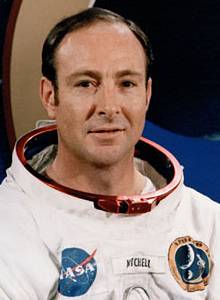 |
| Well Gordon Cooper, Donn Eisele and myself were the backup crew for Apollo 10 and presumably in the normal rotation of things that crew would become the prime crew for Apollo 13. Gordon retired at that point so a new commander was selected and Alan Shepard campaigned for that and naturally got it and he chose Stuart Roosa and myself. Donn Eisele dropped out of the program also. Apollo 13 was originally our flight, when Alan Shepard came on the crew it was determined by headquarters they wanted us to take a little more training time since Alan had not been in the training loop for quiet a few years and so that was when we reluctantly shifted mission with Jim Lovell and his crew and they took 13 and we took 14. |
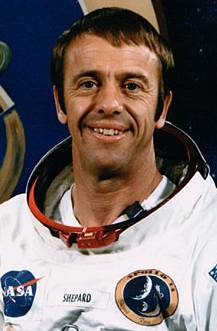 |
| Shepard's Account |
| I had tried everything that I knew to figure out a way to cure the Menieres Syndrome, just absolutely almost at my wits end when one day Stafford came in and said, �You know Al I�ve just been talking to a friend of mine whose involved in the ear business. He�s with a clinic in Los Angeles they�ve been experimenting with a surgical cure for Menieres�, I said, �I�m on my way�. My first move was of course to head for a visit with my old friend Slayton and obviously both of us knew the next available mission which had not been announced was Apollo 13 so I said, �Deke that�s the one I want�, and Deke said, �I think we can work something out�. As I recall a crew had tentatively been assigned for Apollo 13, I frankly don�t remember who they were but I�m sure they were equally qualified guys and disappointed�. |
| Slayton's Account |
| I hadn�t had any further plans for Gordo after Gemini 5. It wasn�t just that I had lost faith in him � I don�t think I really did but he was a hard sell to management because he never really put his heart into training and seemed to spend a lot of his time more interested in racing cars. He had come in at the last minute to back up Gemini 12 for me and I�d been able to turn to him to back up Apollo 10. At that point there was an outside chance that he could have wound up with 13 but he hadn�t done a very good job as backup commander � not good enough to change anyone�s mind. So it was time for him to move on. |
 |
| Cooper's Account |
| By the time of the lunar landings, Al Shepard and Deke Slayton were running the show as far as flight crew assignments were concerned. I was coming off two earlier backup assignments most recently Apollo 10 and before that Gemini 12. I could normally have expected to receive a prime crew assignment next. I had been counting on getting Apollo 13, scheduled for spring 1970 and planned as the third lunar landing. Al and Deke were giving me Apollo 13 all right but as backup. I was furious and told them hell would freeze over before I took another backup assignment. They just shrugged. I knew that politics was now playing a big role in crew assignments. �Deke and I are making crew assignments now�, Al said bluntly. |
| The account given in, "Light This Candle" |
| Apollo 10�s backup crew included Gordon Cooper, who therefore fully expected to take command of Apollo 13 but Shepard�s desires would again intrude on Cooper�s fate. In a masterly-some said devious- stroke of what some astronauts dubbed �astro-politics,� once Shepard had proved to NASA doctors that the surgery had been a success, he convinced Slayton to give him the flight that Cooper had assumed was solidly his. Actually, as Slayton�s partner in crew selections, Shepard essentially assigned himself to Apollo 13, which made Cooper �furious� that Shepard seemed to be placing �his own interests ahead of the program". However, when word of Shepard�s assignment to Apollo 13 reached NASA headquarters in Washington, Slayton and Shepard were overruled. Slayton had no choice but to pull Shepard off Apollo 13. But instead of giving the flight to Cooper, Slayton asked Jim Lovell-currently assigned to Apollo 14-if he could take Apollo 13. �Sure, why not?� Lovell said. |
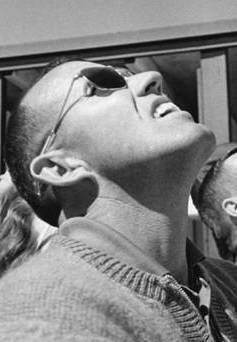 |
| On the 13th November 1968 Gordon Cooper was publicly announced as the backup commander for the Apollo 10 mission and was therefore in the best possible position to get a chance at commanding Apollo 13. So what were the reasons for him being overlooked for this command position? One of the major factors in Cooper's change of fortunes had occurred just 11 days before the launch of Apollo 10 when NASA had made it public that Shepard was back on the active astronaut list Many reasons have been put forward for why Cooper was not chosen for Apollo 13. One female author stated that he was just tired which is strange because he stayed on at NASA for almost a year after being told he wasn�t going to the moon. In Buzz Aldrin�s book, �Men From Earth�, co-written by Malcolm McConnell, it is claimed that Cooper was responsible for landing so far off target during the Gemini V mission and that, �program officials felt Cooper should have done better and he never flew again�. The implication here is that he should have done more to land on target despite the errors in the re-entry computer. Schirra wrote in �Schirra�s Space, �Cooper had recognised a programming error in the computer and had compensated for it with manual controls. Otherwise the splashdown would have been farther still from the recovery ships�. Two accounts, two versions. Did this incident on Gemini V have any bearing on his future career? |
| One of the main reasons given for Cooper never going into space again after 1965 is his love of racing cars. Maybe one week at the beginning of 1969 can be pinpointed as the moment when Cooper�s chances of going into space again were greatly reduced if not all but extinguished. On the 31st of January 1969 one newspaper printed, �� Astronaut Gordon Cooper, an auto racing enthusiast who yearns to get behind the wheel in competition, is entered in the 24 Hours of Daytona sports car race to be run Saturday and Sunday. Cooper has a NASCAR license and is eligible to compete. If Cooper does well in the 24 hour race, he wants to drive in the Daytona 500 late model stock car event which ends Speedweeks Feb.23�. By the 1st of February the newspapers were reporting a different story, �� Astronaut Gordon Cooper, who has done some fancy space flying, was warned by his bosses Friday to quit taking chances on Earth�. |
| Cooper watches the launch of AS-201. Some newspaper reports at the time had him as odds on favourite to command the first Apollo mission. |
 |
| Cooper�s response to being told not to race was, "I don't appreciate it one bit. This racing has been my hobby all my life. All I know now is that my future now probably includes more racing than being an astronaut. They ought to hire tiddlywink players as astronauts. NASA has never said anything about it before, and now they wait until the last minute to cut me off�. For an astronaut assigned to a backup crew in the middle of training for a moon flight and hoping one day to go to the moon himself, taking part in a race that some described as, �250 miles of suicide", appears to be a very irresponsible action to take. To then compound this by very publicly slating his employers must surely be regarded as damaging to any future plans he had for spaceflight. |
| Cooper in a race car during 1967 |
| When his actions are compared to Shepard's then it is easy to see why NASA management found Shepard a better selection for an Apollo command. Shepard had not only stayed at NASA whilst being grounded, he had undertaken risky surgery to correct his balance and then thrown himself into the training cycle. So it was Shepard who got the nod for the moon and not Cooper. When Cooper found out he then began to speak to certain members of the NASA management but it was too little too late, he had not been playing the game whereas Shepard had been making the rules up for the game! Whilst in England to assist the coverage of the BBC, Cooper said in an interview, "I'm considerably younger than Shepard. I'm still in good physical condition. I would not speak too much about Capt. Shepard, I have my own feelings about him. We have a number of astronauts fully qualified to fly airplanes who are very technically qualified, I don't feel that a man who is not fully qualified to fly an airplane without having a co-pilot with him and who has various physica1 problems should bump more qualified people. A lot of empire building and politics is going on that I don't believe should exist in the program. I would have liked to have done a lunar flight, but I'm not going to compromise, the principles I believe in". In his autobiography "Leap Of Faith, he had written, "As I watched the images of man's first steps on the moon, a big piece of me wanted to be up there at that moment. I wondered: Will I ever get my chance"? Well he had gotten his chance and he had let it slip through his fingers. |
| Slayton's part in all of this shouldn't be forgotten. It must also be remembered that Slayton himself had been grounded by a medical condition and had been trying to get back his astronaut flight status and get back into the rotation for a flight. |
| Back to Index |
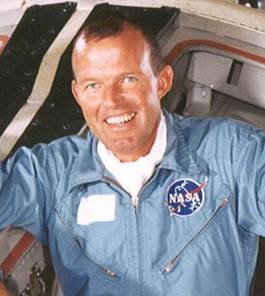 |
